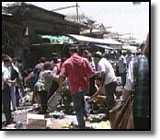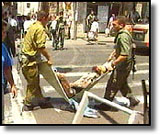
|
Bombs Tears Through Jerusalem MarketTwo bombs have torn through the main Jewish fruit and vegetable market in Jerusalem, killing fourteen people, and wounding more than 150.The bombs went off within seconds of each other, spreading death and devastation over a wide area. Police cordoned off the area and ordered shops to close while they looked for any more bombs. Witnesses saw dismembered bodies covered in dust. Blood soaked the ground, mixed with debris from the market. In the turmoil after the blasts, a stream of ambulances ferried victims to hospital.
Dur: 1'53" A leaflet sent anonymously to Western news agencies said the Palestinian militant group Hamas was behind the bombing. Police say they have witnesses who say the bombers were Palestinians, smartly dressed in business suits. It's the most serious terrorist incident in Israel for more than a year and places the whole Middle East peace process, which had just shown signs of regaining some of its lost momentum, in renewed doubt.
Israeli government leaders immediately bitterly condemned the Palestinian authorities over the attack. The Prime Minister, Binyamin Netanyahu, demanded the Palestinian leader Yasser Arafat crack down on Moslem militants. "We expect the Palestinian Authority and its leader to begin to fight terror as they are committed to, as they haven't done until today, that they will take all the steps required against these terrorists and their operators who roam free," he said. "We aren't ready to accept that murderous acts will be part of our daily lives every few weeks and months and we will await suitable steps," stressed the Israeli leader.
Dur: 1'55" A phone call to Mr Netanyahu from the Palestinian leader, to offer condolences, was angrily brushed aside.
The government shut the borders with the West Bank and Gaza Strip, and told Palestinians working in Israel to return to their homes. Israel is also calling off, for the time being, the resumption of talks on implementing the Palestinian self-rule accords. It was the first major bombing since March last year, when three people were killed and 42 injured at an outdoor cafe in Tel Aviv.
|

|
| Clinton: "We must not let the enemies of peace prevail" |
|
|
| President Clinton condemns the bombs in Jerusalem |
In response to the bombings, the US special Mid-east mediator Dennis Ross has postponed a visit to the region to allow a period of mourning in the Jewish state.
For his part, Tony Blair expressed his condolences to the families of those killed and injured in the bombing.
"I am sure I speak for everyone in the House when I express our deepest sympathy to all those families that are bereaved in Israel today and to the families of those that have been injured," he told the Commons.
"It was an appalling terrorist outrage. Our deepest condolences go to the people of Israel and to our own Jewish community here," he said.
The European Union, which has been mediating between Israel and the Palestinians, strongly condemned the attack and urged Israelis not to let it derail the peace process.
The U.N. Secretary-General Kofi Annan called the bombings "abominable and unfortunate" and appealed to both sides to return to the negotiating table.
"I am disappointed that at a crucial time when we were just on the verge of getting the talks back on track that this should happen," said Mr Annan.
Diana, Princess of Wales, 1961-1997
Conference 97
Devolution
The Archive
News |
Issues |
Background |
Parties |
Analysis |
TV/Radio/Web
Interactive |
Forum |
Live |
About This Site
News |
Issues |
Background |
Parties |
Analysis |
TV/Radio/Web
Interactive |
Forum |
Live |
About This Site
© BBC 1997 |
politics97@bbc.co.uk |


